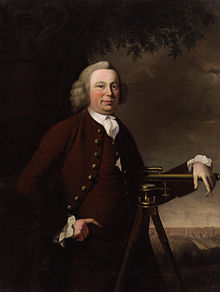James Brindley

James Brindley (* 1716 in Tunstead , Derbyshire , † September 30, 1772 in Turnhurst Hall, Wolstanton , Staffordshire ) was a British canal engineer .
Live and act
The son of a wealthy farming and artisan family grew up in the then under-developed region of the Peak District and received little formal schooling. At the age of 17 he apprenticed to a mill builder in Sutton near Macclesfield and soon showed special technical talent. After completing his apprenticeship, he started his own business in Leek , Staffordshire . In 1750 he expanded his business and leased a mill from the Wedgewood family , who became Brindley's friends. Brindley had a reputation for designing and repairing all kinds of machinery, including building a drainage system for a coal mine in Lancashire in 1752 and a machine for a silk factory in Congleton in 1755 . Francis Egerton, 3rd Duke of Bridgewater , who wanted to improve the transport from his coal mines in Worsley to Manchester , became aware of Brindley and commissioned him in 1759 with the construction of a canal.
The Bridgewater Canal , completed in 1761, is still considered a technical triumph today. The Barton Aqueduct over the River Irwell is a special achievement . Brindley preferred to minimize earthworks and preferred longer canals or tunnels to increased excavation. His greatest merit was the introduction of the clay lining that made his canals watertight. Due to its success, Brindley was used to numerous other canal construction. His thoughts on lock technology were decisive for the development of the narrowboat canal system.
Brindley hoped to link England's four great rivers, the River Mersey , River Trent , Severn, and Thames , with canals (the "Grand Cross" plan). First the Trent and Mersey Canal was built, then from 1772 the Chester Canal. The coal transport from the Midlands to the Thames did not work until 1790, long after Brindley's death. In total, 587 kilometers of waterways were built under his direction.
literature
- Brindley, James . In: Encyclopædia Britannica . 11th edition. tape 4 : Bishārīn - Calgary . London 1910, p. 572 (English, full text [ Wikisource ]).
- George T. Noszlopy: Public Sculpture of Warwickshire, Coventry and Solihull. 2003, ISBN 0-85323-847-2 .
- Christine Richardson: James Brindley: Canal Pioneer. 2004, ISBN 1-870002-95-4 .
- Nick Corble: James Brindley: The First Canal Builder. 2005, ISBN 0-7524-3259-1 .
- Gordon Emery: The Old Chester Canal. 2005, ISBN 1-872265-88-X .
| personal data | |
|---|---|
| SURNAME | Brindley, James |
| BRIEF DESCRIPTION | British engineer |
| DATE OF BIRTH | 1716 |
| PLACE OF BIRTH | Tunstead , Derbyshire |
| DATE OF DEATH | September 30, 1772 |
| Place of death | Turnhurst Hall, Wolstanton , Staffordshire |

